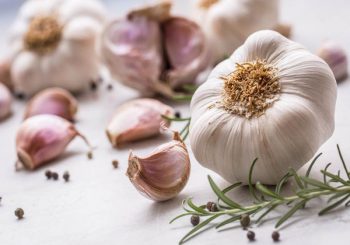By Ty Bollinger
Guest Writer for Wake Up World
Russian penicillin, natural antibiotic, vegetable Viagra… these are just a few of the many quirky colloquialisms that have been used in various cultures to describe one of the world’s most beloved culinary herbs ? garlic. Though they might not seem like much, all those bulbous little blossoms you see in the produce aisle bin at the grocery store represent a treasure trove of healing nutrition that civilizations since the beginning of time have relied upon. Not only as food, but also as medicine.
[pro_ad_display_adzone id=”110028″]
Practically every form of traditional cooking from every region of the world claims garlic as one of its essential ingredients. Just like onions, shallots, leeks, and other vegetables from the Allium family of lily plants, garlic functions as a type of universal folk spice, so to speak. It enhances almost any type of savory food with its exceptional flavor and delectable aroma.
But garlic doesn’t just taste good and smell nice (albeit perhaps not on the breath) ? it’s also incredibly good for you. Garlic is so gosh-darn special in the healing realm, in fact, that a study published in the journal Pharmacognosy Review declared it to represent “a whole pharmacy industry” due to its “broad spectrum of effects.” We’re talking science-backed efficacy in addressing ailments like typhus, cholera, dysentery, influenza, and even cancer. And, this is in addition to its more widely known benefits in helping to boost immunity and ward off colds and coughs.
Allicin: A Panacea for Cancer Treatment and Prevention?
There are a variety of constituents in garlic that lend to its “superfood” status. But the one I want to focus on here boasts many, many citations in the scientific literature and is known as allicin. It’s among the most biologically-active components of garlic. Allicin is the component that was first reported on back in 1944 as having broad-spectrum antibacterial properties, and it’s probably the most widely-studied. The sum of scientific research thus far has established that allicin is beneficial for all sorts of things, including lowering lipid levels and preventing blood coagulation.
In terms of cancer, allicin has repeatedly demonstrated powerful antioxidant, anti-tumor, and generalized anticancer properties that have caught the attention of researchers from around the world. Collectively, they see it as an amazing preventative and remedy for this dreaded condition. One of these researchers is Dr. Rashid A. Buttar, Medical Director of the Center for Advanced Medicine and Clinical Research in Cornelius, North Carolina. Dr. Buttar has presented on the merits of allicin on numerous occasions, explaining in detail how this powerful substance acts in direct defiance of cancer throughout the body.
Research Into Allicin as a Cancer Therapy
The use of high-concentration, stabilized allicin as an adjunct therapy in cancer treatment has been a major focus of Dr. Buttar’s research, and he’s devoted much of his time and practice to expanding it. He points out that in vitro, in vivo, and human clinical trials have all shown allicin to possess powerful anti-cancer effects. He found allicin helps protect against a variety of cancers, including those associated with the stomach, colon, esophagus, pancreas, and breast.
The National Cancer Institute (NCI), a division of the National Institutes of Health (NIH), has published several population studies that affirm this. What this suggests is that elevated intake of allicin may help to prevent these and other types of cancer from forming, and may even help in alleviating cancers that already exist. At least three randomized clinical trials support a statistically-significant reduction in the combined risk of all cancers associated with the use of allicin, and other studies show similar benefits.
Some of the studies NCI cites as evidence of garlic’s vast anti-cancer potential include:
- The European Prospective Investigation into Cancer and Nutrition (EPIC), an ongoing multinational study that has linked consumption of both garlic and onions to a reduced risk of intestinal cancer
- The Iowa Women’s Study, a large prospective study that shows a strong correlation between garlic consumption and reduced risk of colon cancer
- Multiple population studies out of China showing a powerful association between garlic consumption and reduced risk of esophageal, prostate, and stomach cancers
- A California study that links garlic consumption to reduced risk of pancreatic cancer
- A study out of France showing a strong correlation between garlic consumption and reduced breast cancer risk
Garlic: Good for the Belly, Good for Your Immune System
Where allicin really seems to shine is in the maintenance of a healthy digestive system, where roughly 70 percent of the human immune system lives. Multiple randomized human clinical trials ? these representing the “gold standard” of science-based medicine ? reveal garlic’s incredible protective potential for the gastrointestinal system.
In addition to protecting against viruses, bacteria, and fungi ? including “superbugs” like methicillin-resistant staphylococcus aureus (MRSA) ? the allicin in garlic shows a strong propensity towards healing the gut and protecting it from toxicity and other damage. Presumably, this is a major factor in its antimicrobial abilities, which help to balance the internal microbial terrain that makes up the gut microbiome.
A compromised gut is often the place where cancer starts for many people. Therefore, fortifying its supportive microbial army to fight off enemy invaders, while also helping to patch up any “leaks” that might be present, makes garlic a promising protective force against cancer. Take a look at the science and see for yourself how garlic has been shown to help maintain gastrointestinal health, and potentially protect against cancers of the gut:
- A Chinese study involving more than 5,000 men and women at high risk of stomach cancer showed that garlic extract combined with selenium can significantly reduce one’s risk of all tumors, and especially those of the stomach
- A Japanese study demonstrated a decreased risk of colorectal adenomas in patients who supplemented with aged-garlic extract
- A study out of the Netherlands showed that the organosulfur compounds in garlic can help protect against skin cancers
What’s the Best Way to Get the Benefits of Allicin?
Since allicin only exists in fresh garlic, it’s not always the easiest substance to obtain in supplement form. Freshly-cut garlic, or garlic that has very recently been finely sliced or diced into tiny pieces, produces an enzyme known as alliinase that converts alliin, an odorless amino acid, to allicin. This enzyme becomes activated only when garlic is exposed to a pathogen, for instance, or is somehow altered, as in the case of the breaking of the outer membranes of garlic cloves during cutting or crushing.
The problem with the allicin that’s produced, though, is that it only remains stable for a very short time before converting into other substances. Amongst these are organosulfur compounds that, though they provide health benefits in other ways, may not be as effective as allicin. In other words, to really take advantage of allicin specifically, one would have to eat large amounts of freshly-cut garlic within about 30 minutes of when it was cut in order to obtain substantial amounts of the substance suitable for therapeutic use.
The good news is that technologies exist to stabilize allicin for longer periods of time. This allows its use in advanced therapies where having to cut large amounts of fresh garlic and eat it quickly simply isn’t efficient or feasible. Dr. Buttar has seen firsthand how specific extraction methodologies that result in “exponentially higher than previously attainable stabilized allicin content” have helped cancer patients find real relief ? even those patients with late-stage progression of the disease.
The best way to obtain allicin in supplement form is to seek out a garlic extract that contains an optimized ratio of both alliin and alliinase, allowing for the precise conversion of alliin to allicin in the lower digestive tract. Enteric-coated garlic supplements that contain these two ingredients in the proper amounts will completely bypass stomach acid, which degrades their integrity. This allows for the maximized release of highly-potent allicin directly into the body.
“In order to provide the body with the pharmacologically active forms in the garlic, the activity of the alliinase must be maintained until the pills reach the non-acid environment of the intestine,” explains the food science resource Functional Foods, Cardiovascular Disease and Diabetes about how this works. “The pills are protected from the stomach acid by being coated with cellulose esters which require the presence of intestinal enzymes for the coating to be removed.”
According to this same science-based resource, the best time to take such supplements is during or just after a meal that’s preferably high in protein. The pH conditions in the stomach will be elevated from eating such a meal, inhibiting the various alliinase-inactivating factors that can lead to reduced allicin-releasing potential in garlic.
Live your life without the threat of cancer. Go here to be notified each week about new, cutting-edge information that impacts your health.
Sources and References:
- Extracts From the History and Medical Properties of Garlic
- Garlic and Cancer Prevention
- Garlic: A Review of Potential Therapeutic Effects
- The Immunomodulation and Anti-Inflammatory Effects of Garlic Organosulfur Compounds in Cancer Chemoprevention
- Garlic and Organosulfur Compounds – Linus Pauling Institute
- Functional Foods, Cardiovascular Disease and Diabetes, 1st Edition
Originally published at The Truth About Cancer and reproduced here with permission.
About the author:
 Ty Bollinger is a health freedom advocate, cancer researcher, former competitive bodybuilder and author. After losing several family members to cancer, he refused to accept the notion that chemotherapy, radiation, and surgery were the most effective treatments available for cancer patients. He began a quest to learn all he possibly could about alternative cancer treatments and the medical industry. What he uncovered was shocking. There is ample evidence to support the allegation that the “war on cancer” is largely a fraud and that multinational pharmaceutical companies are “running the show.” Ty has now made it his life mission to share the most remarkable discovery he made on his quest: the vast majority of all diseases, including cancer, can be easily prevented and even cured without drugs or surgery.
Ty Bollinger is a health freedom advocate, cancer researcher, former competitive bodybuilder and author. After losing several family members to cancer, he refused to accept the notion that chemotherapy, radiation, and surgery were the most effective treatments available for cancer patients. He began a quest to learn all he possibly could about alternative cancer treatments and the medical industry. What he uncovered was shocking. There is ample evidence to support the allegation that the “war on cancer” is largely a fraud and that multinational pharmaceutical companies are “running the show.” Ty has now made it his life mission to share the most remarkable discovery he made on his quest: the vast majority of all diseases, including cancer, can be easily prevented and even cured without drugs or surgery.
For more information, visit:
[pro_ad_display_adzone id=”110027″]








